It’s back.
I heard that phrase several times during a recent visit to New York. In each case, it referred to the resurgence of the city’s bustling jazz scene. Live performances have increased steadily since the end of the COVID lockdown, and musicians now seem busier than ever. The inspiration for my latest trip came last February at Birdland when I found myself seated next to pianist/vocalist Dena DeRose. I’ve known Dena for several years, and after the general business of catching up, I asked her when she was going to perform again in New York. She said she was appearing at Birdland July 19-21, and when I replied that the 19th was my birthday, she invited me to attend the opening night performance. After a few phone calls and a little research, what started as a one-night visit to the Apple became a five-day stay with seven concerts over four nights. The reviews below reflect my original choices, but for each concert I attended, there was at least one other worthy substitution. So, hang on tight; here we go…
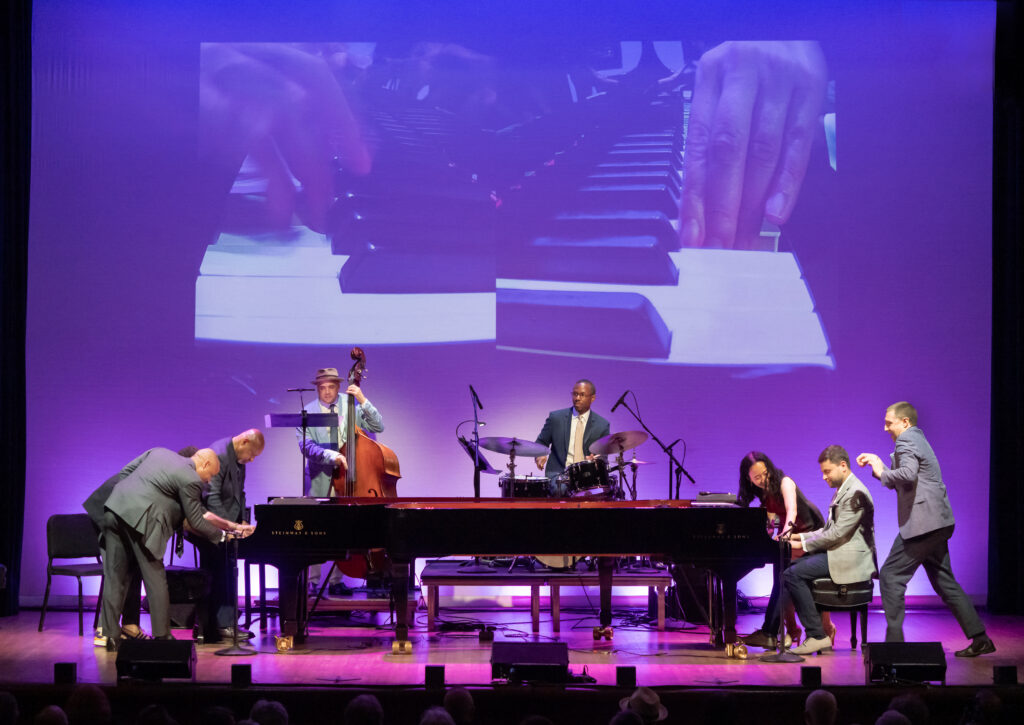
ARTIST: Kenny Barron, Benny Green, Helen Sung, Joe Block, Aaron Diehl
DATE: July 17, 2024
VENUE: 92 NY; New York City
PERSONNEL: Kenny Barron, Benny Green, Helen Sung, Joe Block, David Vierelles, Aaron Diehl (p); Peter Washington (b); Willie Jones III (d).
Aaron Diehl‘s first concert as Artistic Director of Jazz in July resembled similar concerts hosted by his predecessor, Bill Charlap: a core group of great pianists featured in solo, duo, and trio formats in a general round-robin. While Charlap usually limited the group to three pianists, Diehl doubled the roster to six, including himself and a surprise guest brought up from the audience. The stage was filled with two grand pianos aligned at the curve, with the bass and drums on a platform right behind. Diehl opened the concert with a Walter Davis, Jr. original called “Uranus”. In addition to displaying Diehl’s impressive technique and vivid imagination, Peter Washington and Willie Jones III showed their great chemistry and improvisational chops. After introducing the concert, Diehl brought out Benny Green, and the two pianists paired for an inspired version of Cedar Walton‘s “Something in Common”. Green’s swinging octave doublings contrasted with Diehl’s dancing single lines, and it was fascinating to hear how Green pulled a brighter tone from the very same instrument that Diehl had played moments earlier. Green followed with a trio version of “Say You’re Mine”. This seldom-played Duke Pearson composition started as a ballad, but the rhythm section’s medium-tempo groove inspired Green into soulful, propulsive swing. Kenny Barron joined Green on stage for a delightful unaccompanied duet on “Monk’s Dream”. Barron shone with a tasty solo full of great invention and ample humor. Green’s bright sound reemerged, even though he was now playing the opposite Steinway. His solo was much more declarative than Barron’s lyrical improvisation, and it made me wonder why these two brilliant pianists had never recorded together. For the next tune, Barron opened “Surrey with the Fringe on Top” with the verse as composed by Richard Rodgers, but when he launched into the chorus, he modulated the song’s second phrase up a step for melodic variety. Far from a gentle pony ride, this surrey moved along at a full gallop, with Barron throwing one fiery idea after another over the driving rhythm.
Helen Sung paid tribute to the late Geri Allen with a dazzling solo version of “Feed the Fire”. It started as a fantasia played staccato. Sung used Allen’s distinctive melody to tie together the various episodes of her performance. She employed rubato sequences to segue between tempi and used dynamics to emphasize the different colors and ideas in the arrangement. Joe Block, the youngest of the guest artists, joined Sung for a unique setting of Dizzy Gillespie‘s “Con Alma”. Block displayed his maturity with sensitive backing to Sung’s gentle contributions—some of which she played by strumming the strings inside the piano. The interplay between these two pianists (and a very active Washington) yielded the most intricate counterpoint of the night. Block’s ensuing solo feature was a tender rendition of “Ruby, My Dear.” Introducing a series of serpentine lines and plush re-harmonization, Block gave a unique twist to this Monk standard without sounding like the composer. Next, Block and the rhythm covered “Ambrosia,” the first of three Kenny Barron originals played in the concert. The piano and bass engaged in an active dialogue and the arrangement built to expansive chords before it descended with a passionate return to Barron’s melody. Green’s homage to Barron was a blazing solo turn on “New York Attitude.” The middle section was remarkable for an incredible episode in octaves and an extended passage in ultra-fast stride. Apparently, Diehl was supposed to play a solo piece next, but in awe of Green’s brilliant display, Diehl deferred to Sung, who performed “Re-Conception”, her version of George Shearing‘s “Conception.” As Sung produced musical fireworks from the keyboard, Washington’s bass conversed with her piano before moving back to a four-beat walk, and Jones offered a crisp statement over interjections from the group. Barron rounded out the program with a hip solo version of Billy Strayhorn‘s “Isfahan”.
Earlier in the evening, Diehl related a touching story about two Cuban jazz musicians who sought out Barron while he was performing in Havana. Barron devoted an hour of his time to the young musicians, with the master teaching his tunes, and the young players demonstrating the intricacies of Cuban jazz styles. After Barron’s final solo, Diehl returned to the story to announce that one of the young Cubans was in attendance. It was none other than David Virelles, and he was invited to join the other five pianists for the concert finale, which was a wild free-for-all on Barron’s tune “Voyage.” Each keyboard was surrounded by three pianists, and in the musical equivalent of a feeding frenzy, every pianist poked their hands in to add a few notes to the overall mêlée.
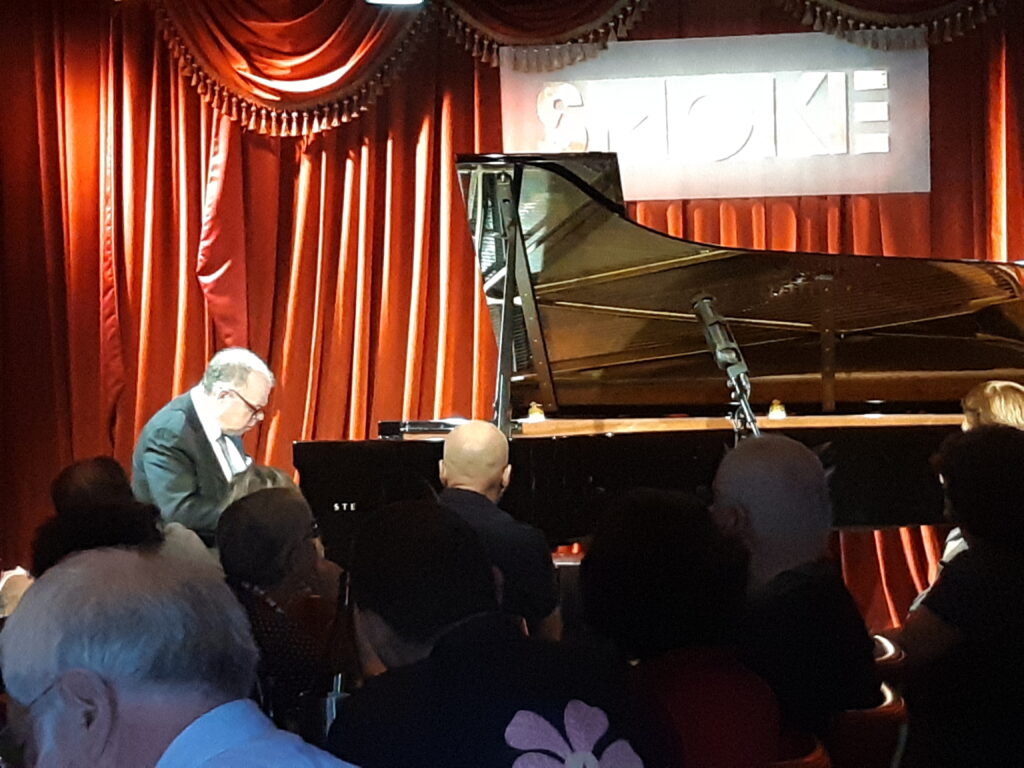
ARTIST: Bill Charlap
DATE: July 18, 2024
VENUE: Smoke; New York City
PERSONNEL: Bill Charlap (p).
Smoke may be a jazz club, but it felt like a recital hall this week. A nine-foot Steinway covered most of the stage, with only a narrow gap left for the piano stool and the week’s occupant, Bill Charlap. The capacity audience was quiet and attentive, but not hesitant to laugh at Charlap’s frequent song quotes. One of the great custodians of the Great American Songbook, Charlap loves these compositions, and he treats them with great care. Opening with a rare Harry Warren song, “There is No Music”, Charlap pulled crystalline notes from the mighty instrument before moving into another Warren classic, “The More I See You,” which was performed in a medium walk and featured a sly quote of Gerry Mulligan‘s “Venus De Milo.” The parade of quotes continued with Irving Berlin‘s “Blue Skies,” which included interpolations of “Pent-Up House,” “In Walked Bud,” and “Little White Lies.” Duke Ellington‘s “I’m Beginning to See the Light” featured nods to “Personality” and “Manteca”. Of course, the overall performance was much more than an elaborate version of “Name That Tune”: Charlap offered evidence of his musical maturity in a reflective setting of “You Took Advantage of Me” and spiced up “How About You” with thrilling cross-rhythms. Like Dexter Gordon before him, Charlap appreciates the lyrics to these songs. He acknowledged lyricist Alan Jay Lerner and recited the words (from memory) of “On a Clear Day” before treating the audience to a slow and expressive exposition of the Burton Lane melody. When that song ended, Charlap held the silence for several seconds before moving into a reharmonized version of “On the Sunny Side of the Street.” He followed with a rubato-to-beguine version of “I Could Write a Book”. He continued within the Rodgers and Hart songbook for a medium-up exploration of “My Funny Valentine.” I had to leave before the end of the set. Still, the last piece I heard would have been an effective closer: a meticulous reconstruction of Jerome Kern‘s “All the Things You Are”. I could have listened to Charlap all night, but a prior commitment at Birdland forced my early exit. As it turned out, that show was excellent, too.
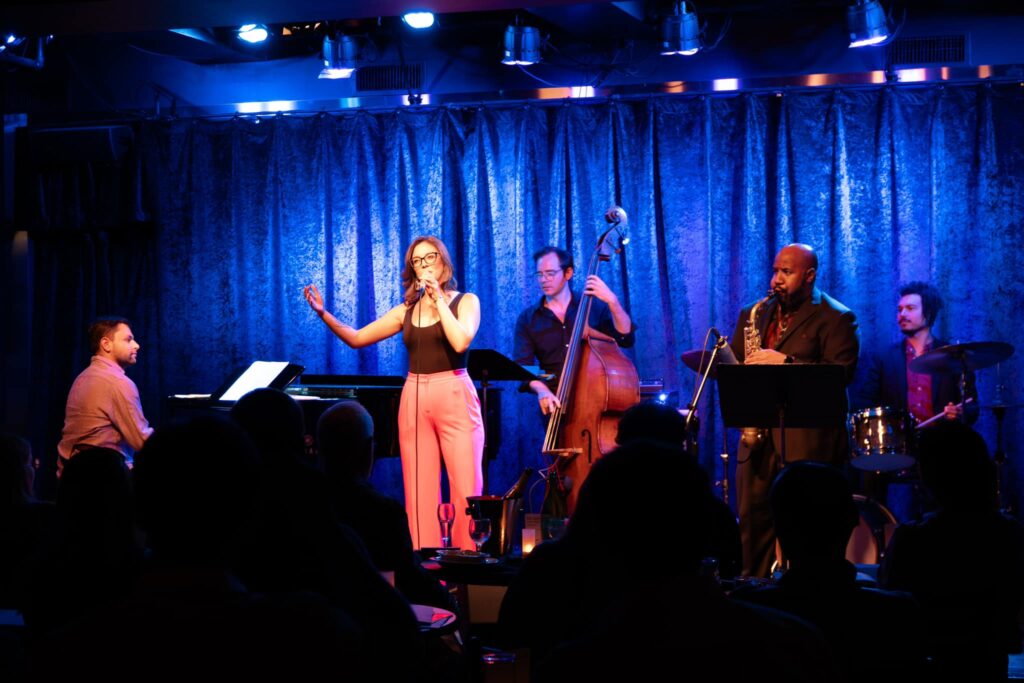
ARTIST: Alyssa Allgood
DATE: July 18, 2024
VENUE: Birdland; New York City
PERSONNEL: Alyssa Allgood (v); Christopher McBride (as); Joe Block (p); Alex Claffy (b); Charles Goold (d).
Chicago vocalist Alyssa Allgood was at Birdland to celebrate the release of her latest album, “From Here.” Funded through crowdfunding and a generous grant, the album features an all-star backing group (see below) in a program of Allgood’s original compositions and arrangements. As it was impractical to tour with the album’s instrumentalists, Allgood sought out talented local musicians who could read and perform her challenging settings. In New York, the rhythm section was led by Joe Block (whom I had just heard the night before at 92 NY), and his talents as an accompanist were evident throughout Allgood’s single 75-minute set. Block ably supported Allgood in a duo performance of “Above All Else,” a poignant original about discovering positive lessons from negative situations. The group had great ensemble, especially for one with limited rehearsal time. Their flawless reading of Allgood’s tricky mixed-meter arrangement of Joni Mitchell‘s “Both Sides Now” allowed her to soar into a passionate final chorus which illuminated the familiar lyrics. As her lyrics were an important element of the program, Allgood limited her scat improvisations to a few extended solos. Two of those solos–the opening “On a Clear Day” and “No Good”—overflowed with inventiveness, as each chorus topped the ones before. The audience, which included several of New York’s finest jazz singers, was overwhelmed by the performance, giving Allgood and her band a sustained standing ovation. Those New Yorkers who missed the Birdland performance should know that Allgood will return to The Apple for a return engagement (with the same band) on August 27 at Dizzy’s.
The album, released a few months ago on Next Records, is certainly a reason for celebration. Featuring the considerable talents of alto saxophonist Greg Ward, pianist Geoffrey Keezer, bassist John Patitucci, and drummer Kendrick Scott, it presents an inspired “official” version of Allgood’s new repertoire. Allgood sings with the same passion in these studio recordings as in live settings. The opening song, “Burn (for Betty)”—curiously not included in the Birdland set—is a stunning tribute to Betty Carter. Allgood’s multi-layered composition changes tempos and moods on cue, much like Carter’s long-form masterwork “Sounds…Movin’ On.” The chord sequence encouraged a superb, horn-like improvisation from Allgood. Her other compositions offer empowering messages for her listeners, and the album’s finale, “Turn to Gold” includes a lovely multi-tracked vocal part (all sung by Allgood) which emphasizes the album’s positive outlook. Readers of this website know that I have followed the artistic progression of this astounding vocalist for several years. I can honestly say that every time I hear her live or on recordings, she exceeds my expectations. She is a major talent well on her way to achieving the recognition she deserves.
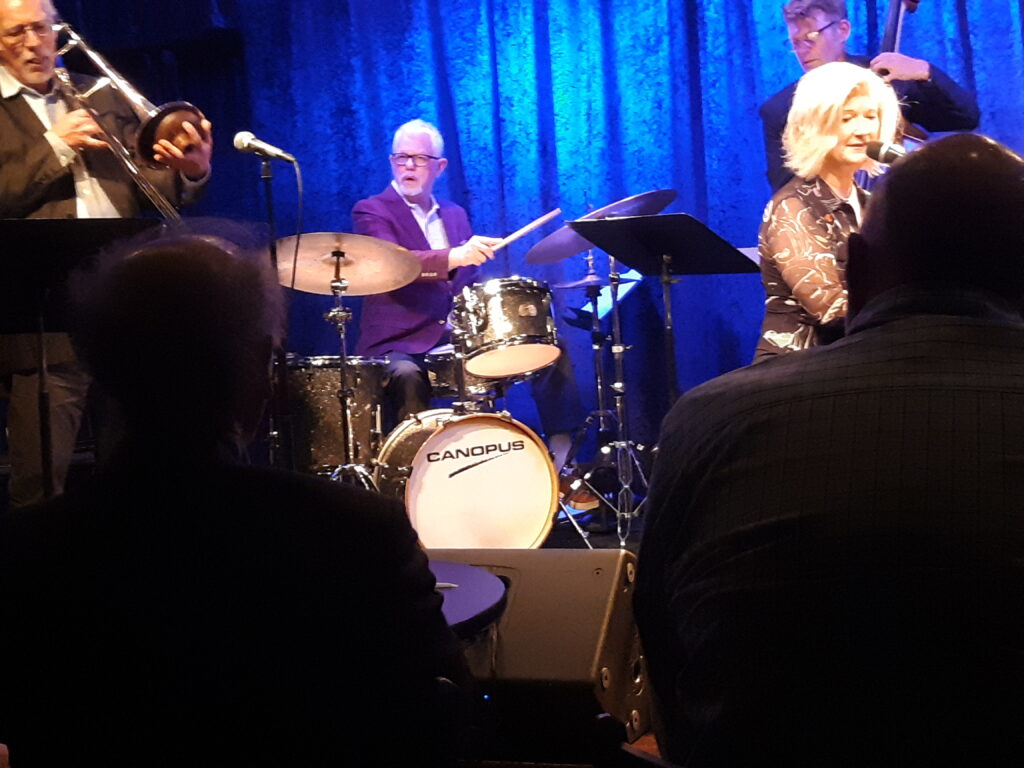
ARTIST: Dena DeRose
DATE: July 19, 2024
VENUE: Birdland; New York City
PERSONNEL: Dena DeRose (p,v); Martin Wind (b); Matt Wilson (d); Ed Neumeister (tb).
The Dena DeRose Trio is one of the unsung marvels of the current jazz scene. DeRose, an American pianist and vocalist who teaches and resides in Graz, Austria, only makes one or two trips to the US each year, usually for recording and performing with her trio. The trio’s other members, bassist Martin Wind and drummer Matt Wilson have very busy schedules, and there is rarely enough time for rehearsal when DeRose comes to town. While this band comes in “cold” for its gigs, they instantly restore their chemistry onstage to present surprising impromptu changes to DeRose’s well-crafted charts. However, on the Friday night sets at Birdland, many of those changes came from the wild and unpredictable trombone of guest Ed Neumeister. A duet in the second set on “I Thought About You” found DeRose and Neumeister throwing ideas at each other like a musical volleyball. DeRose’s incorporation of the James Bond vamp added a sinister touch to the well-known standard. A master of the plunger mute, Neumeister produced sounds that alternated between comic (“Blue Monk”) and passionate (Horace Silver‘s “Peace”).
Before Neumeister’s entrance in each set, the trio lit into repertoire from their earlier recordings, including Shirley Horn‘s “I Just Found Out About Love” and DeRose’s original “Ode to the Road”. The first set also included a powerful reading of “Lover” which built from a tender piano solo to a torrential storm of multi-voice counterpoint. The late Bob Dorough was remembered through two of his greatest compositions. “Small Day Tomorrow” and “Nothing Like You”, and the performance of the first set’s finale, Wayne Shorter‘s “United” was so powerful that DeRose popped one of the bass strings on the piano! The second set was considerably looser, with inspired jams on “Green Dolphin Street” and “The Great City”. On a personal note, I was quite surprised when DeRose encouraged the audience to clap—on beats 2 and 4, of course—and that became the accompaniment for a sing-along on “Happy Birthday” to little old me. The two sets were so thrilling that I returned to Birdland the next night for one more set (see below).
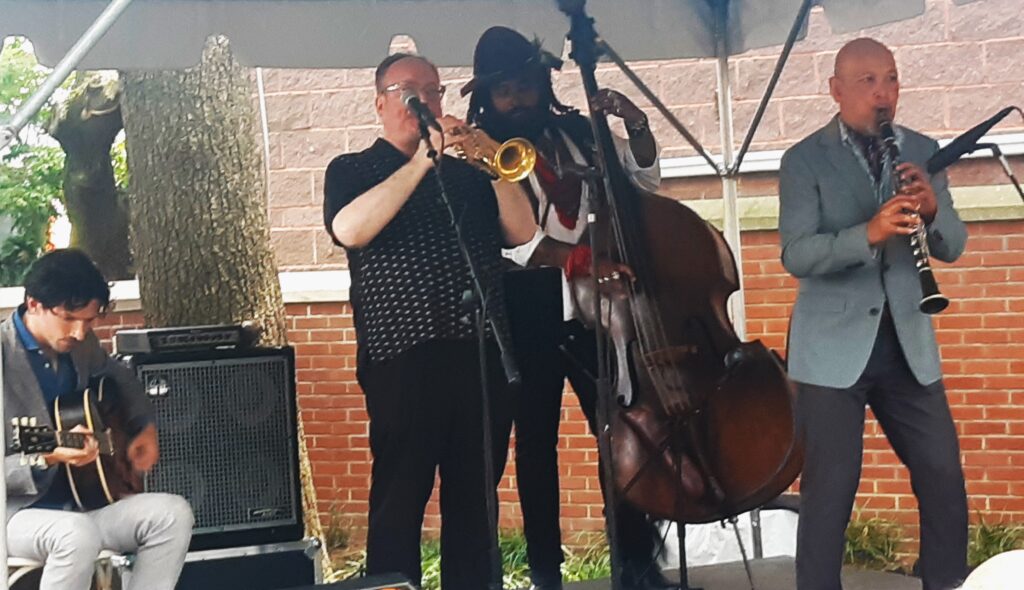
ARTIST: Jon-Erik Kellso
DATE: July 20, 2024
VENUE: Louis Armstrong House Museum (Garden); Corona, Queens
PERSONNEL: Jon-Erik Kellso (cor); Evan Christopher (cl); Josh Dunn (g); Russell Hall (b).
The Louis Armstrong House Museum, which now incorporates Armstrong’s original home and a state-of-the-art archive, has become a haven for traditional jazz musicians in and around New York. The garden, one of Armstrong’s final household renovations, is the location for a series of summertime concerts. The Saturday afternoon performance by cornetist Jon-Erik Kellso was offered free of charge to all. The garden was filled with an enthusiastic group of fans covering several generations. While the band was a pickup group, it was based on the same instrumentation as the group that Kellso leads each week at the Ear Inn. There is neither a drummer nor a pianist in these groups, and the resulting sound reveals an intimate approach to classic jazz. During a nearly two-hour set, there was a great variety of subtle sounds, including Kellso’s great variance of tone colors produced without a mute, Evan Christopher‘s rich sound in all registers of the clarinet, Josh Dunn‘s understated chords played on a hollow-body acoustic instrument, and Russell Hall‘s outstanding bowed solos. Naturally, the band’s repertoire included many songs associated with Louis Armstrong, including “Struttin’ with Some Barbecue,” “Big Butter and Egg Man,” and “Weary Blues,” but there were no repetitions of classic Armstrong solos, nor any outright attempts to imitate his sound. Rather, these musicians reflected their profound love for Armstrong by creating their own styles within the language long established by the master. While jazz has made many stylistic changes since Armstrong’s heyday, it is encouraging to see all of the older styles still played in venues around the world. The young musicians who dedicate themselves to past styles have kept this music alive and thriving, yet like Kellso’s group, they have no outward pretensions. They just play great music that’s fun to hear on a warm summer afternoon.
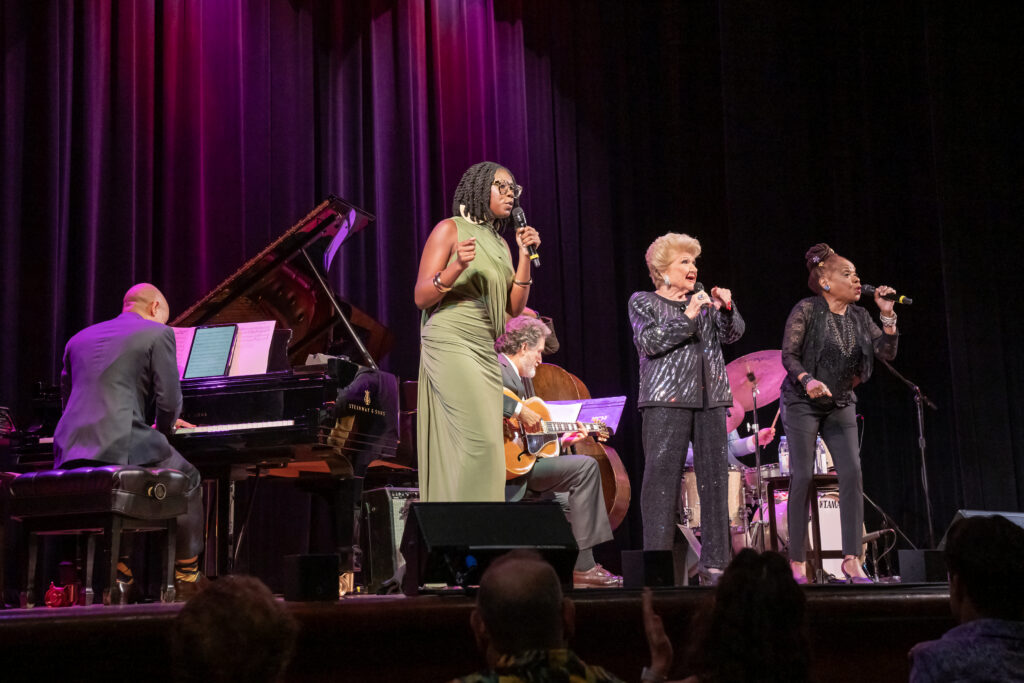
ARTIST: Ekep Nkwelle, Catherine Russell, Marilyn Maye
DATE: July 20, 2024
VENUE: 92NY, New York City
PERSONNEL: Ekep Nkwelle, Catherine Russell, Marilyn Maye (v); Aaron Diehl (p); Matt Munisteri (g); Vicente Archer (b); Aaron Kimmel (d).
The unexpected length of the afternoon concert and the long subway ride back from Corona put me into a time crunch. I needed to eat dinner and pack for my trip home, so I reluctantly decided to watch the evening concert from 92NY on streaming video. Thanks to publicist Meryl Wheeler, I made a late-minute change. Watching the concert after the fact, I am truly sorry that I was not there in person. Artistic Director Aaron Diehl created a marvelous vocal showcase for three talented singers spanning multiple generations. Diehl used his own trio, featuring bassist Vicente Archer and drummer Aaron Kimmel to accompany all three vocalists (with guitarist Matt Munisteri added for Catherine Russell’s set and the grand finale).
Ekep Nkwelle is an up-and-coming vocalist from Washington, DC. She is blessed with a wide vocal range and great flexibility. She exhibited a great deal of energy as the concert’s opening act. Her opening tunes, a swinging “Day In, Day Out” and pensive “Never Will I Marry”, revealed the strong influences of Sarah Vaughan and Nancy Wilson, respectively. As with many young singers, she is still polishing her craft, and there are occasional inconsistent vowel sounds and over-accented notes that break the continuity of her vocal lines. She takes daring risks, and most of them come out spectacularly (such as the extra beats added within her intro to “My Shining Hour”, performed with only Kimmel’s brushes in accompaniment). However, her breath control failed her on a sustained high note in the Ellington ballad, “In a Sentimental Mood”; the tone was diamond-like at first, but she held it a little too long and the sound started to deteriorate. These small technical issues will work themselves out in time, and she has the potential to become an excellent jazz singer.
Catherine Russell is a great favorite of New York audiences, and her performance showed why. Her beaming smile reflected her absolute confidence in her stage manner, and her musicality was evident through her outstanding choice of repertoire. She opened with two songs about the city. “How About You?” was swung with great abandon, while “The Brooklyn Bridge” was performed at a comfortable walking tempo. She followed with a pair of songs about dancing—the unfairly neglected “Dance Only with Me” and “The Best Things Happen When You’re Dancing”. Russell communicated her deep passion for both songs with heartfelt storytelling and subtle melodic embellishments. After noting that 2024 is the centennial year of Dinah Washington, Russell sang an intensely moving version of The Queen’s “Let Me Be the First to Know” which wrung out all of the deep emotions of the lyric. Her set closed all too soon with a rip-roaring take on Irving Berlin’s “Puttin’ on the Ritz”.
Marilyn Maye had the final spot, and she made the best of it. Instead of individual tunes, Maye performed three medleys featuring the songs of Cole Porter, Duke Ellington, and Fats Waller. The Porter was the most elaborate, covering seven tunes—most with “you” in the title, so she was looking, concentrating, and getting a kick, before discovering it under her skin. She had a great time on stage, verbally teasing Diehl and Kimmel, and complimenting her adoring audience. Most surprisingly, at 96 years young, Marilyn Maye sings with great power and emotional depth. She has done a magnificent job of maintaining her voice, and she still takes risks in performance. Her extended set was capped with two classic ballads, “Angel Eyes” and “Lush Life”, performed with Diehl as the sole accompanist. She explored the drama inherent in both songs, building her interpretation of the former over 1 ½ choruses (with an intriguing turnaround to the bridge) and she momentarily interrupted her performance of the verse in the latter to tell the audience that Billy Strayhorn was only 17 when he wrote this remarkably mature song. After a fun upbeat version of “On the Street Where You Live”, all three vocalists returned to the stage to close the concert with a joint version of Peggy Lee‘s “I Love Being Here with You”. A great time was had by all.
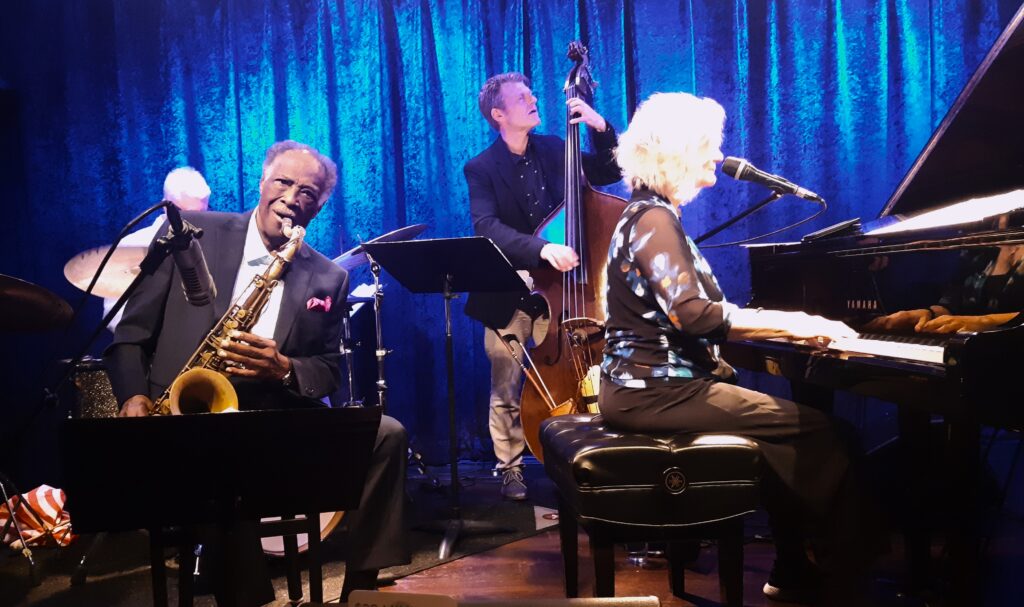
ARTIST: Dena DeRose
DATE: July 20, 2024
VENUE: Birdland; New York City
PERSONNEL: Dena DeRose (p,v); Martin Wind (b); Matt Wilson (d); Houston Person (ts).
The final stop of my trip was another visit to Birdland, and it showed me another side of the Dena DeRose Trio. On this night, they provided gentle support for the great tenor saxophonist, Houston Person. Now approaching his 90th birthday—which he will celebrate later this autumn with a gig at Birdland—Person’s style is sparer and less energetic than it was just a few years ago. While Person plays fewer notes now, the phrases he does play are reminiscent of the haunting improvisations of late-period Lester Young. DeRose helped Person throughout the set, helping him organize his music, and calling tunes that he knew and/or requested. His solo on “Only Trust Your Heart” was poetic, and his exposition of the Barbra Streisand classic “People” brought tears to several eyes, including mine. Then DeRose called “Trav’lin’ Light” and Person seemed re-energized with a wailing, soulful improvisation that sounded like the Houston Person of old. Person reminded me of President Joe Biden, as both of these elders can be eloquent and soft-spoken at times, but are also capable of a great roar in the proper setting (It was the day after this concert that Biden reluctantly withdrew from his re-election campaign.) DeRose’s trio also played a few tunes on their own, including a medium swing version of “The Touch of Your Lips”, a burning “Day In, Day Out” (with an overwhelming solo by Matt Wilson), a reprise of Bob Dorough’s “Nothing Like You”, and a thrilling ride on “Get Out of Town” with DeRose ending the set with several wild slams to the keyboard.
Twelve hours later, I was on the Amtrak heading home. As always, there were plenty of concerts I wanted to attend, but it was just not possible to catch everything in a few days. It’s OK, though. I’ll be back, too.
Thanks to Jim Anderson, Ken Bloom, Peter Cherches, Kay Kostopoulos, Lydia Liebman, Dan Morgenstern, Ricky Riccardi, Ulrike Schwarz, April Thibeault, Susan Tobocman, Meryl Wheeler, and all of the artists for making this a very special birthday celebration.